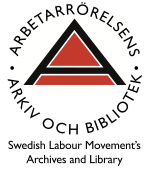Ongoing projects
Labour’s Memory – Digitization of annual and financial reports of blue-collar worker unions 1880-2020
The project “Labour’s Memory” aims to make materials from trade unions organizations withing the LO sphere widely accesible, covering the period from the 1880s to the present.
The project team will digitize activity reports and annual financial statements from local, regional (Uppland), national (Sweden), and international trade union organizations.
The digitized material will then be made searchable through indexing and computational linguistic search methods. The goal is to enable finding all occurrences of a word regardless of its inflection or spelling, which will enhance access, particularly to older texts. The material includes everything from handwritten, typewritten and printed to digital activity reports and annual records.
The funder is RJ for Infrastructure research (Riksbankens Jubileumsfond).
Past projects
Long-term perspective on home-based work
A collaboration and up-coming conference is organized by the Swedish Labour movement’s archive and library in cooperation with the Centre for Women’s Development Studies in Delhi and the WIEGO (Women in Informal Employment: Globalizing and Organizing) Network. We invite abstracts for papers (or other forms of presentations) discussing home-based work. For further information, please visit the designated page.
Mind the gap! An entangled history of economic citizenship and the demand for equal pay 1945-2000
Focuses on the importance of international and transnational entanglements for the development of economic citizenship, i.e. national and international unions’ demands for equal pay between 1945-2000. […] We use the hermeneutical approach of Histoire croisée, which contains both elements of comparative analysis and transfer analysis and focuses on the assimilation and adaptation of entanglements, but does not neglect the fractions and differences between different levels.
Towards a global history of consumer co-operation
This project will establish a global network of scholars with the aim of producing a global history of the consumer co-operative movement. This will take the form of a book. Combined with statistical information and bibliographies, the anthology is intended above all to create a resource for future studies on the co-operative movement, and will be of interest not only to historians of social movements and consumption, but also to co-operative activists.
Researching the history of the informal sector – methodological challenges and opportunities
ARAB organized with financial support by Riksbankens Jubileumsfond (RJ), a workshop on research on the informal labor market that took place on the 9-10th of June 2015.
Facket, kvinnan och världen (The Union, the woman and the world) – Feminism in international labour organizations
On June 18, 2013, the workshop Feminism in international labour organizations was held at our premises. Some of the leading researchers in gender and equality studies as Yevette Richards Jordan, Dorothy Sue Cobble, and Suzanne Margarete Fanow, attended the workshop. The women who participated in the first International union conferences around 1919, where several Swedish women participated, believed strongly that they had created a new platform for women and sisterhood. The female perspective has always been a part of the labour movement, but women had to struggle to take a place within it.
The participants talked about this part of the female struggle for equal rights at work, in society, and at home, both economically and legally.
The workshop in all its complete parts was broadcast at UR Samtiden (Swedish Educational Broadcasting Company).
Worlds of Women – International Material in ARAB’s Collections
A project that aims to inspire researchers, both academics and those actively interested in researching working women’s history, to look beyond national borders. This is an overview of available sources at the Labour Movement Archives and Library (ARAB) in form of essays and inventories.
The project was organized through financial support by Riksbankens Jubileumsfond (RJ).

